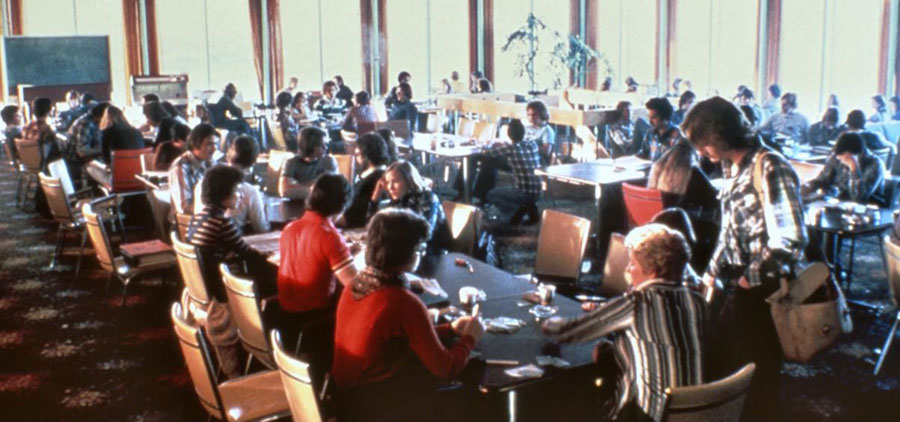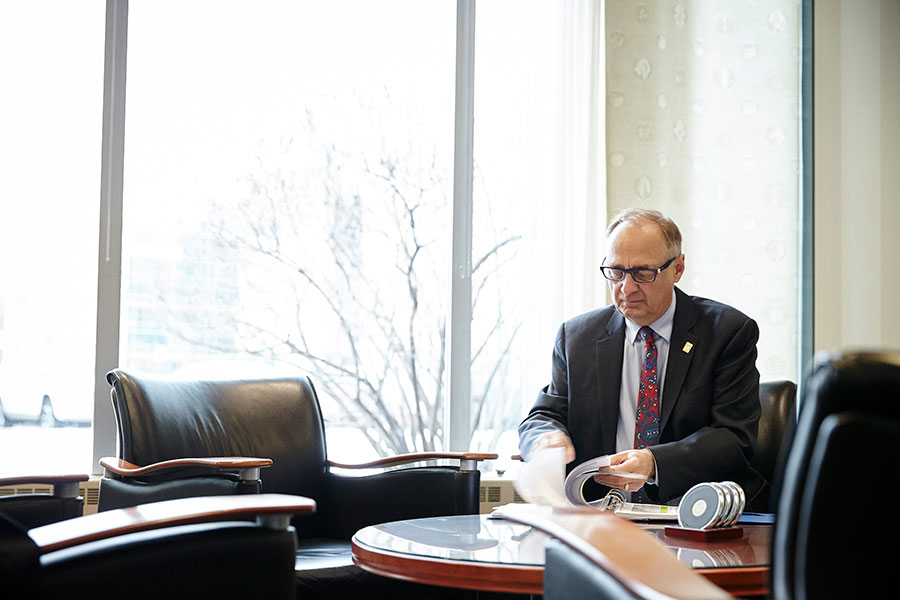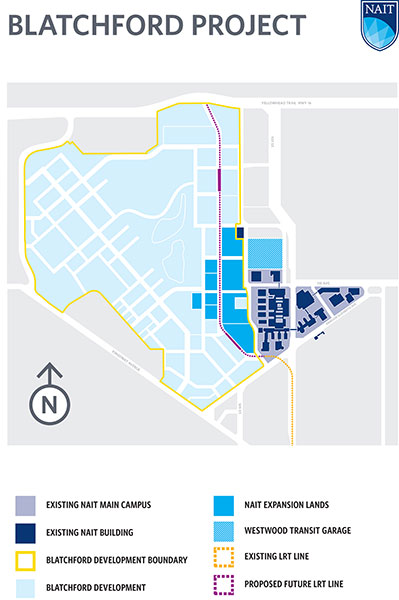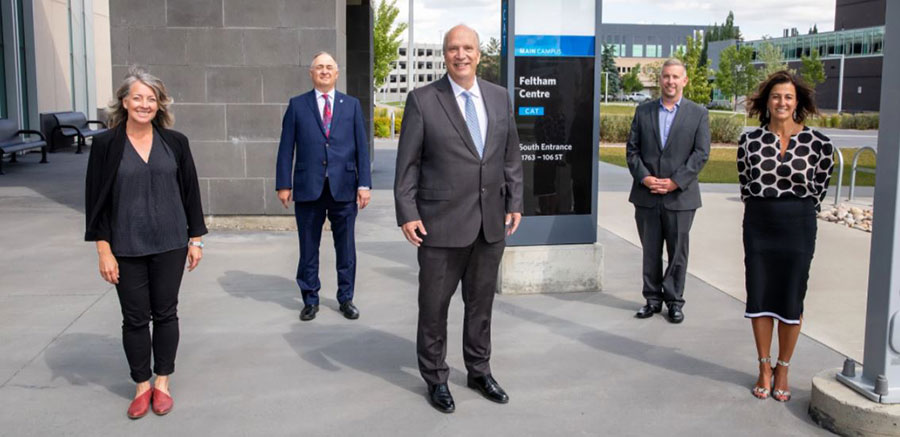“I managed to take off Christmas Day, but it's been really busy.”
Rock and roll, you could say, is one reason Dr. Ray Block (Accounting ’74) ended up in the position he’s in now, as the only student-turned-president of NAIT.
In the early ’70s he was just out of high school, and playing bass and singing in a hard rock band. One night they played a gig where only a few people showed for the early part of the set. By 1 a.m., however, when the band was ready to wrap up, the room was full.
“When we were done, we said, ‘Thank you for coming!’” says Block. “Some of the bigger boys came up and said, ‘Oh no, you keep playing.’” They did, until five in the morning. “And I think they gave us 20 bucks.”
Block wasn’t even thinking about going into accounting then, but he knew that the math wasn’t adding up to a future as a musician. The idea of returning to school began to resonate with him.
In retrospect, that gig also hinted at the importance of seeing something through to its end. These days, the pressures have changed from enthusiastic music fans to things like fiscal challenges and global pandemics, but you still don’t pack up your gear and go, even if it’s going to mean sleepless nights.
As the polytechnic’s leader since December 2019 and now passing the baton to incoming president and CEO Laura Jo Gunter, Block stayed despite the demands, knowing the stakes for NAIT were too high not to. Recently, as he retires following nearly a decade at the polytechnic, starting as its chief financial officer, we talked to Block about his full-circle career path, the future of NAIT, and why the last eight months have been one of the toughest gigs of his life.
techlifetoday: You’ve furthered your education throughout your life, but you started at NAIT. Why?
Block: I was really focused on getting a job, and back then there were lots of university grads that weren't getting jobs. I think my dad had an influence on me, too. He said, “Do you want to get a job?” So he was more supportive of the polytechnic [education]. When I came out of university [after I went to NAIT], I think I had 10 job offers because I had hands-on experience and not [just] theory.
What’s it like to think your career brought you back here decades later?

What's amazing to me is that all my classes at NAIT were substantially in the tower building, where the executive offices are today. So where our boardroom is now is where we had a lounge back then. It was the hangout place for the students – where you tried to meet single girls. You sort of go full circle and sit in that boardroom now and think, “Hey, this is where I used to hang out.”
Why did you come back to NAIT as CFO?
I was at Athabasca University as vice-president finance and administration. My wife wanted to be where family was in Edmonton. So at the last minute I thought, “I'm just going to fire in my application.” [After the interview, then-president] Glenn Feltham phoned me up and at home, which is unusual, and said, “I really want you on my team.” We kind of hit it off right away.
The two of you would work together for almost a decade.
We were really a good fit. I was more of the behind-the-scenes kind of guy; he was in front of the camera. There's never been a camera or a mic I liked, and Glenn is kind of the opposite! I think we really worked well together and we formed a good friendship over the years as a result. We just seem to on most occasions agree. And when we didn't he was willing to hear me out.
There's never been a camera or a mic I liked.
We did over a half-a-billion dollars of capital construction and investment. I thought I was going to be leaving sooner than I did, but Glenn said, “Oh, hang in there! Stay with me and let's keep going.” And then he left!
And you agreed to temporarily take on the leadership role.

I said I would not consider a long-term commitment to the role, but I’d certainly do everything I could to help in the transition.
How did it feel to become president of the school where you started your post-secondary education?
The first part of it was just being thrilled to have this great opportunity to take this role for a great institution. But then the shoes started falling off. I managed to take off Christmas Day, but right up until just recently it's been pretty much every day. It's been really busy.
And you’ve had to make some difficult decisions.
My whole intention all along was to set the table for the next NAIT president. I felt that the tough decisions needed to be made and done before that new president came.
One of the things that I felt overwhelmed by was that I was making decisions about people and people's lives. So, one of the first things I did was form [an external] task force for a sober second thought on the things we were looking at.
We had to make decisions that pierced us to the heart.
Although it's only been eight-plus months, it's probably been the toughest season for NAIT. The downsizing we did came with tears. I truly mean that. We had to make decisions that pierced us to the heart. But, at the end of the day, it's about preserving this great institution.
How do you feel about NAIT going forward?
I think we're positioned very well. [We deliver] polytechnic education, hands-on education, that prepares people for jobs and industry. We have the Productivity and Innovation Centre, a facility [for business innovation] that’s second to none in this part of the world. It's going to be a major contributor to economic growth and sustainability for Alberta.
 Could the Blatchford lands be considered another advantage? You played a key role in acquiring them. What was that process like?
Could the Blatchford lands be considered another advantage? You played a key role in acquiring them. What was that process like?
It was seven years in negotiation [with the City of Edmonton]. It was probably the toughest negotiation I've ever been involved in. It may have kept me around longer because there was no way I was going to give up.
Glenn said that this sets the table for NAIT for the next hundred years. Now, looking ahead, needs of post-secondary institutions are changing a lot. I'm not sure what campuses will look like in the future, but I know I’d rather be holding on to land in the centre of the city than a paper bond or GIC.
You decided to leave before Laura Jo Gunter takes over. Why is that?
Laura Jo has been a president, she's been a VP academic. She’s going to be great. Something that has played very hard on my decision to leave now is that she needs a clear deck. She needs to critically look at things and change what made sense to Glenn and Ray at the time. She had wanted me to stay on even just for a little while. And I said, “I just can't. I think it will impair your ability to do what you need to do.”
I think she's going to be the right person for the right time – just as I believe the group that I was with were the right people for the time we were in.
Now you’re finally getting a break from it all. But what will you miss?

Without question, it's the people and the great friends that I've made along the way. It's the people and the relationships that mean everything to me. The executive group was outstanding. [Once I became president] we didn't have time to learn about working together. We had to dive right in the deep end of the pool and swim like mad. Kudos to every one of them.
I love NAIT – everything about it. And I believed in everything that we were doing. This will be one of my career highlights. I'll always be an alum in my heart.
